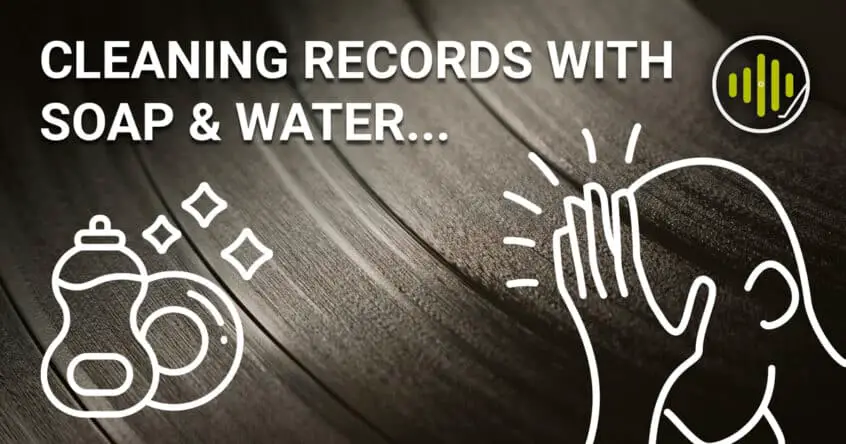I’ll cut right to the chase; don’t do it.
You’ll find countless articles on how to clean vinyl records with soap and water online, and I’m here to explain why that might not be such a wise idea.
Sure, we all want clean vinyl records, free of pesky pops and clicks – that much is a given.
But what if I told you that, sure, cleaning vinyl records with soap and water is cheap, but it could damage your precious records in the process.
Why not?
I get asked week in, week out, about cleaning vinyl records with soap and water.
It’s a fair question… After all, you clean dishes with soap and water, why not your records?
The water aspect is perhaps the most surprising, and that’s a different question altogether. I’m often asked: “can you use water to clean vinyl records”.
…And the short answer here, is yes… Just not regular tap water.
I’ll cut to the chase: regular tap water contains impurities, such as mineral and limescale deposits that can contaminate the record surface, potentially building up in the grooves.
Some mains water supplies are better than others. The area where I live is particularly bad for limescale, which becomes very clear when you boil a kettle of water. Very quickly, the limescale builds up inside the kettle, requiring regular descaling.
The same goes for show screens, as the limescale builds on the surface through day-to-day use.
Anyone who’s put regular tapwater into a household iron will know all about how the limescale clogs up the device—just imagine this building up inside your record grooves!
Not good!
Always Use Distilled Water
Any record cleaning process, either store-bought or homemade should involve distilled water (de-ironized water at a second best).
Through the distilling process, the impurities of regular water are removed, resulting in a much purer water that won’t contaminate your records.
Why Can’t I Use Soap on My Records?
Well, you can… when all is said and done, you can clean your records any way you like.
But it’s worth noting that records are made from PVC, and the ingredients in soap or any other household cleaning products for that matter might not be safe or gentle enough on this type of plastic surface.
The second point to consider is residue. A good record cleaning fluid will clean records gently and effectively without leaving any significant residue on the record surface.
Consider this? How often have you noticed residual dish soap on your dishes?
Even just a cursory glance at the ingredients on your dish soap bottle could be enough to put you off.
A good record cleaning fluid will get the job done as gently but effectively as possible, and will the product will be thoroughly tested on vinyl records. The same can’t be said for the manufacturer of your dish soap.
Many guides on how to clean vinyl records with soap and water will also recommend adding isopropyl alcohol. Again, proceed with caution here, as high amounts of alcohol in any record cleaning process could damage your records.
The topic of isopropyl alcohol divides opinion across the vinyl community, but there are theories about heavy alcohol use in record cleaning fluids leading to damaged plasticizers in PVC surfaces over time. Again, proceed with caution.
My preference is for a low or zero alcohol record cleaning fluid, developed by a specialist in record cleaning fluid – my go-to provider is GrooveWasher, and their cleaning fluids are made with biodegradable ingredients that won’t damage your records.
Cleaning Vinyl Records with Soap & Water – The Bottom Line
Records are expensive. Why risk cleaning your collection with potentially harmful water or cleaning products to save a few bucks?
A good record cleaning kit is simple to use, and most manual record cleaning fluids won’t break the bank.
For a guide on the step-by-step process of how to clean vinyl records, you can follow our complete guide. But when all is said and done, don’t forget to enjoy the music.




Easy check: drop sample of your detergent ( its not soap) and tap water onto horizontal glass eg small mirror or similar glossy surface. Let it air dry in a dust free box/ cupboard/ cover . Check for smear . My water leaves tiny amounts of carbon/ charcoal or whatever is used to filter the water back at treatment plant. Stylus on Goldring 1042 ( fitz line contact type) hears it so i clean only dirty old vinyl with this and then ultrasound if liked.